|
Watching A Touch of Sin [Tian zhu ding], the latest film from Chinese maestro Jia Zhangke, I was left in little doubt that its director has a rather dim view of the direction that modern China is taking. In each of the four stories that make up the film, encroaching capitalism and its trappings provide the trigger for a variety of confrontations and violent responses. This is neatly summarised in what is essentially a prologue, where a vulnerable-looking man is seen riding a motorbike on a quiet mountain road and is stopped by three youths armed with axes and demanding money. Instead of meekly complying, he pulls out a gun and without a flicker of emotion shoots them all dead, then goes on his way as if nothing had happened.
The first story focuses on Dahai, whom we quickly learn is a habitual complainer, with good reason as it happens, though some of his compatriots are fed up with hearing about it and scorn his inability to transform words into action. The principal targets of his ire are the village chief, who sold the local state-owned mine fourteen years earlier and has failed to deliver the promised dividends for the village, and mine boss Jiao Shengli, who appears to have personally profited from the deal. When a workers are rounded up to cheer Jiao as he arrives in his private plane, Dahai uses the occasion to publicly confront him about his alleged corruption, and takes a severe beating from one of Jiao's goons for his trouble. For Dahai this is the turning point, and in the scenes that follow he is transformed into a figure of armed rebellion, a one man assault on the corrupting and counter-revolutionary influence of the pursuit of wealth at the expense of the communal good, but uses the opportunity to settle the odd personal grudge on the way.
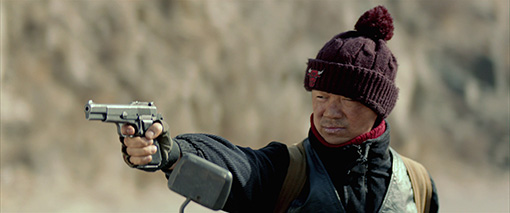
In the second story, the taciturn San'er returns home following what we gather is an extended absence. His appearance is greeted with a degree of coolness by his mother, his wife and his young son, and where he has been is never openly discussed. We do know that he has been regularly sending money home from a variety of locations, and the initial suspicion is that he and his wife are separated and that San'er has come home solely to visit his family. But when his wife searches his bag she discovers a compass and pistol, and San'er certainly has the cold, emotionally detached demeanour of a soldier who has turned mercenary. And we know only too well what he's capabale of, as it was he who coldly gunned down the youths in the opening scene. But just what has he been doing during his abscene? The mystery deepens when he buys three train tickets to different destinations from a tout outside the main city station, and it's only in the final ten minutes of the story that the dots are connected. I can say no more, but the revelation remains true to the film's overriding theme.
We are initially misdirected into thinking that the focus of the third story will be the respectable-looking Zhang, a married man who is having an affair with Xiaoyu, who works as a receptionist at a massage parlour. Zhang has clearly been promising to tell his wife that he intends to leave her but has repeatedly failed to pluck up the courage to do so, and Xiaoyu is now talking in ultimatums – either Zhang tells his wife the truth so that they can be together or they end the relationship. But when the two part company at a railway station, instead of following Zhang home to watch him wrestle with his decision, the film stays with Xiaoyu, as she returns to her night job at the massage hotel. Then one evening she is assaulted at her workplace by an unexpected visitor, the effects of which are set to dangerously rebound at a later date.
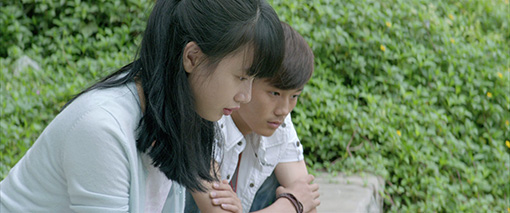
In the fourth story, affable young garment factory worker Xiaohui inadvertently causes an accident when he distracts a colleague. He is informed by the foreman that his wages will now go directly to the injured man until he recovers, and Xiaohui promptly leaves to visit his friend in another town and seek alternative employment there. He lands a job as a waiter at a plush-looking hotel, whose female employees double as prostitutes for wealthy male visitors from Hong Kong and Taiwan. Here Xiaohui strikes up a friendship with female co-worker Lianrong, to whom he soon finds himself attracted. When he discovers the true nature of her profession he again departs and secures another low paid job elsewhere, but begins to realise that repeatedly running away is taking him nowhere.
The changing face of modern China appears to be a subject dear to Jia Zhangke's heart, but while there is a strong meditative quality to Still Life and 24 City, two of his previous explorations of this issue, A Touch of Sin feels more like a film born from anger, a cinematic call to arms against the corruption and injustice that are synonymous with the gradual and socially divisive encroachment of capitalist values. Indeed, for those familiar with modern China largely through its cinema, the picture painted here is genuinely jarring, presenting us with a society that is as corrupt and class-divided as any western equivalent.
But as with twin journeys in Still Life and the generational chapters of 24 City, these are first and foremost personal stories set against the changing political face of China rather than overwhelmed by it. Jia is not looking to dissect the politics of changing times, but to explore its impact on those exploited by it and the possible consequences of ignoring their plight. The trappings of this new commercialism coat the background of scenes like metaphoric wallpaper, from Boss Jiao arriving in town on his private jet and being greeted like a visiting movie star to the customers of the hotel at which Xiaohui finds employment, lounging in business suits and making deals loudly over the phone, whilst underpaid young girls perform titillating parodies of patriotic parades and wait for their turn to be called on for paid sex.
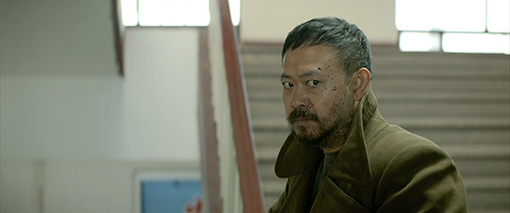
Just as the stories themselves are varied in content, so are the individual responses to this new society from which the central characters find themselves excluded. All four tales culminate in an act of violence, but the context and motivation change with each story, and not all are directed outwardly to others. Each of the protagonists is guilty of the suggestive 'touch of sin' of the title, small moral transgressions that circumstance is set to promote to something far more serious. Yet by the end there's an inescapable sense that the real sins are being committed not by this unfortunate handful of individuals, but the society that pushes each of them into a personal abyss.
As compelling in its scenes of quiet contemplation as either of its above named thematic predecessors, the film is nonetheless as shocking in its violence as any film you're likely to see all year. And I can't overstate my warning about this particular aspect of the film – there's little in Jia's previous work to prepare you for its extremity or its chilling (and subtly CG-assisted) realism, and even when you are able to anticipate what is coming, the unpredictability of its timing still delivers a considerable jolt.
As ever with Jia, every scene is textured in a manner that layers each of the stories with enough subtle social, personal and political detail to form the basis of a whole separate essay, whether it be the speed with which migrant workers are interviewed by the police when a murder is reported, or Lianrong's compulsion to leave inane comments at the foot of news stories that she reads only the headlines of on her iPad. The care with which each story is constructed and developed also ensures that even seemingly throwaway moments impact on later events, from the fruit knife that Zhang is forbidden from boarding a train with to the conversation between Xiaohui and Lianrong about the Buddhist belief in reincarnation.
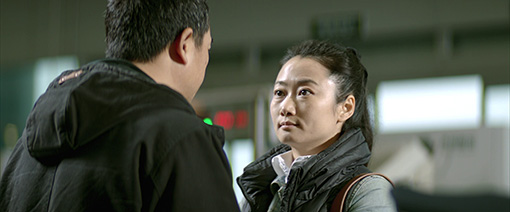
A Touch of Sin is without question Jia Zhangke's most confrontational film to date, but in some ways is also his most easily accessible for newcomers to his distinctive style, at least those with strong constitutions. Impeccably directed and featuring some gorgeous scope compositions by Jia's regular lens man Yu Likwai, it's a film that enthrals, shocks, enlightens and saddens in equal measures, and for my money is one of Jia's very finest achievements.
A few words of warning. Simulated violence against humans aside, there are a couple of sequences here that are likely to have animal lovers reaching for the fast forward button. The first involves a duck having its throat cut by a farmer, which appears to have been done for real. The second involves the merciless whipping of a horse to the point where the beast all but collapses. Whether this was deftly faked or not I cannot say – either way, it's not an easy sequence to watch, but does have a later pay-off that should have a few of you cheering (I certainly was), and the animal itself has a metaphoric role as a symbol of post-revolutionary liberty.
A Touch of Sin was shot digitally on Arri Alexa cameras, and Arrow's Blu-ray boasts a pristine condition 2.40:1 HD transfer that was likely taken straight from the digital master. There is thus not a dust spot or trace of picture instability, and the quality of the image is intermittently striking, notably in wide shots of industrial landscapes or crowds, which the crispness of the detail is exceptionally good. Colour rendition is pleasingly naturalistic, with richer hues singing when the conditions demand it (the costumed street theatre in the first story, for instance). The contrast is lively and boasts solid black levels, but is still generous enough in its range to ensure that picture detail is clearly visible in all lighting conditions.
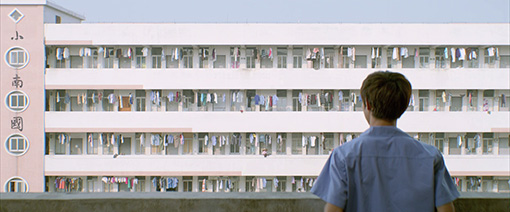
The DTS Master-HD 5.1 surround track is in similarly sparkling shape, with an excellent dynamic range, crystal clear reproduction of dialogue, music and effects, and subtle but effective use of directional sound. The gunshots, when they come, are suitably jarring.
The English subtitles are clear and of an unobtrusive size, but are fixed in place.
A rare Arrow disc with no extra features. A bit of a shame.
A richly detailed, consistently gripping and precision made allegory on the changing face of modern day China, A Touch of Sin looks and sounds lovely on Arrow's Blu-ray, but if extra features are your bag then you're in for a disappointment. Frankly both the film and the transfer are too good for this to bug me that much, so this release still comes highly recommended, albeit with the above mentioned warnings in mind.
|